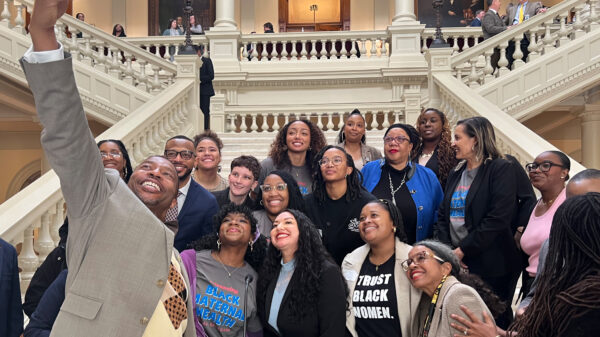ACLU of Georgia Legal Director Cory Isaacson was among opponents of Georgia Senate Bill 1, who was not allowed to give testimony before the Senate Youth and Education Committee on February 4. The committee voted to advance the bill to the full State Senate, which approved it on February 6. This is the testimony Isaacson had prepared in opposition to the bill, which bans transgender girls and women from participating on female sports teams in Georgia.
My name is Cory Isaacson, I’m legal director at the ACLU of Georgia, a lifelong Georgian, and the mother of two daughters and a son. I’m here to speak in opposition to SB 1. This bill legalizes discrimination against kids, encourages unnecessary litigation, and creates hostile environments in our schools — and it should be stopped.
SB 1 bans transgender girls, starting in 6th grade, from competing on teams designated for females. Trans kids are a tiny percentage of the adolescent population, and trans athletes an even smaller percentage. This bill targets a vulnerable minority of kids and formalizes their exclusion.
But my focus today is not on the targeting and the discrimination that this bill codifies — though that in and of itself should be enough for this body to prevent it from moving forward. My focus today is on the provisions of the bill that give a private right of action to any student and their parents who believe they have been directly or even indirectly harmed by an alleged violation of this law.
What’s meant by indirect harm? I don’t know, and nobody in this room knows either. It is vague and expansive — the kind of language that opens up the litigation floodgates.
At the same time that Governor Kemp is prioritizing reducing civil litigation in this state, and decrying the exorbitant costs of litigation, this bill invites and enables individuals to drag people into court whenever they believe they’ve been even indirectly harmed by an alleged violation.
And the bill doesn’t even specify who can be sued, further opening the door to dangerous, frivolous, and unpredictable litigation.
Students, parents, coaches, schools, administrators, athletic organizations – all could be targeted in court under this bill. It gives any aggrieved student and their parents the right to sue, and who they choose to target is up to them. And even if the litigation ends up being completely baseless – whoever is targeted in the suit still has to face the scrutiny, the shame, and the costs of defending against it.
The bill further encourages litigation by promising a successful litigant attorney’s fees and all litigation costs. Attorneys will be eager to litigate under this bill.
Outside of litigation, the bill also mandates school compliance with an aggressive grievance and appeals process, further consuming administrative and educator resources. Public schools and teachers are already stretched thin. By opening up schools, districts, and educators to administrative complaints and litigation, this bill redirects funds and resources away from the classroom and into the courtroom.
And the target of this bill will not only be kids who are transgender. Inviting complaints, lawsuits, and intense scrutiny into who belongs in girls sports will inevitably lead to invasive questioning and policing of female athletes generally, especially those who don’t conform to gender stereotypes. Girls who are taller, stronger, or more muscular than their peers may be accused of being too masculine, suspected of violating these anti-trans restrictions, and may face dangerous complaints and legal attacks. This bill creates a toxic environment where children who should be free to play and compete in a fun and supportive environment instead may fear being targeted for simply excelling in their sport, and an environment where school staff have to navigate legal threats instead of focusing on their students.
This body should not be in the business of codifying the targeting of vulnerable kids, or of opening the litigation floodgates against kids, schools, coaches, and educators across our state. I urge this committee to reject this bill.



